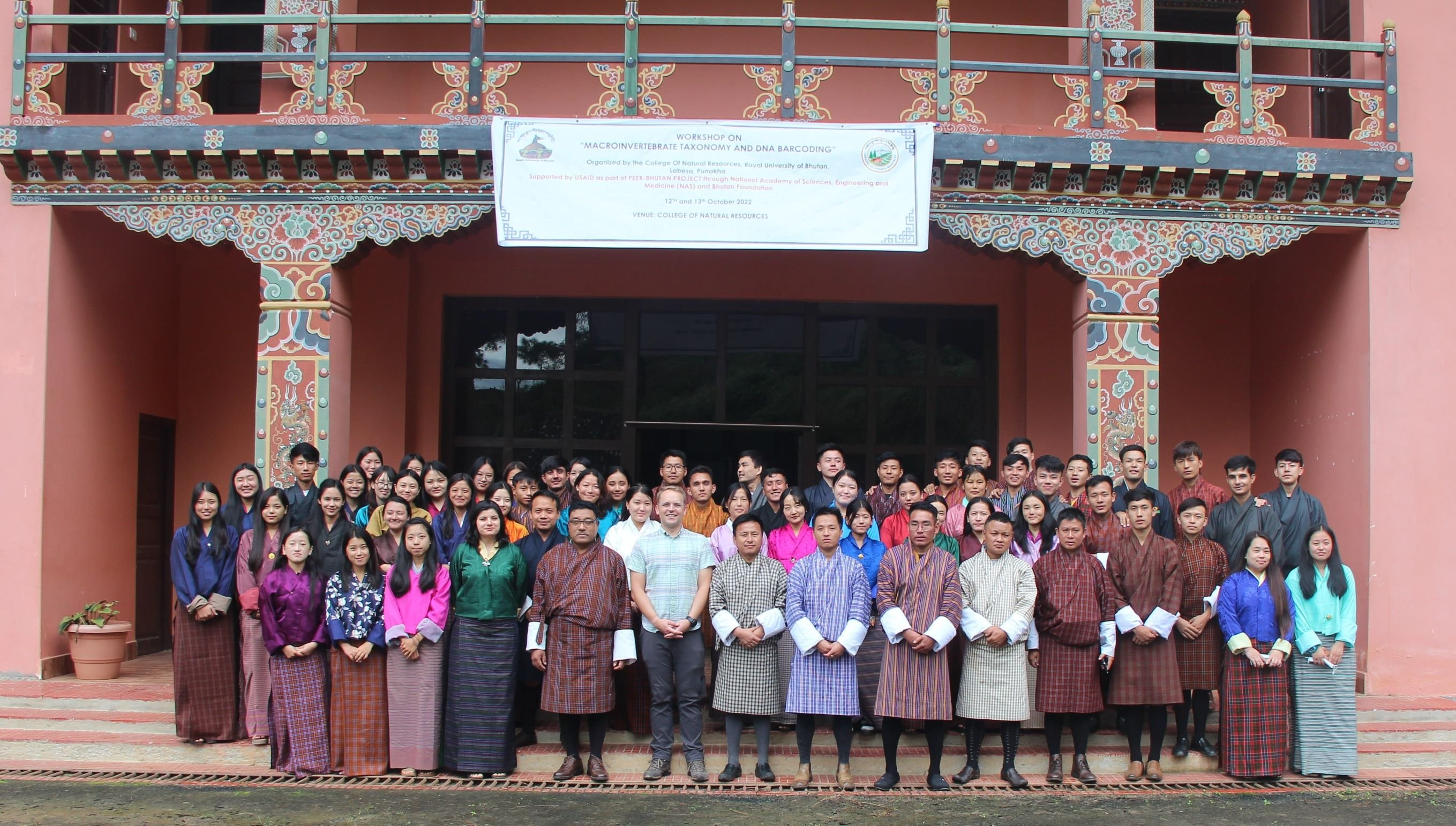|
Bhutan (2021 Deadline)
Baseline data for freshwater biodiversity conservation in the face of climate change in Punatsangchhu basin in Bhutan
PI: Tshering Dorji (tdorji1.cnr@rub.edu.bt), Royal University of Bhutan
U.S. Partner: Paul Frandsen, Brigham Young University
Project Dates: April 2022 - June 2023
Project Overview
Climate change is impacting freshwater biodiversity through higher water temperatures. The impact can vary over altitude and between streams affected by human disturbance (e.g. agriculture). Conservation plans for freshwater biodiversity require baseline data like water temperature and air temperature, water quality parameters, and biodiversity distribution data. Macroinvertebrates (a ubiquitous and diverse group) are used as model indicators for biodiversity. These indicator organisms are most useful when identified to species, frequently done with the help of DNA barcoding.
In Bhutan, there had previously been no baseline data available on seasonal water or air temperature along riparian zones and no comprehensive data on macroinvertebrate diversity along altitudinal gradients. This PEER project therefore aimed to collect and analyze data on species-level macroinvertebrate diversity within the Punatsangchhu Basin from both undisturbed (forested) and disturbed (agricultural) streams along an altitudinal gradient of 3500 meters above sea level (MASL) in the Bhutan Himalaya. The team built a DNA barcode database of macroinvertebrate specimens, the first of its kind in the Eastern Himalaya, and a macroinvertebrate reference collection in the laboratory of the College of Natural Resources, the only institute in Bhutan where conservationists and environmentalists are trained. Collectively, the findings will complement the ongoing efforts by freshwater ecologists around the world trying to understand the impacts of climate change on mountain stream biodiversity and will provide key data from the Eastern Himalaya for global DNA barcode reference databases.
Environmental conservation is one of the four pillars of Bhutan’s development philosophy, “Gross National Happiness.” However, hydropower is the highest revenue earner and subsistence agriculture the largest employer in Bhutan. Both of these are directly dependent on freshwater streams and rivers but also can have negative impacts on river ecosystems. The findings from the project can provide vital data on freshwater biodiversity for the National Biodiversity Centre and other agencies like National Environment Commission to help frame national policies for biodiversity and ecosystem conservation. Furthermore, the findings will serve as baseline data for long-term monitoring of the impact of agriculture on freshwater diversity.
Final Summary of Project Activities
The PI Tshering Dendup and his team completed field visits to selected stream sites, installing temperature data loggers and collecting macroinvertebrate samples. Across the visits, they replaced loggers previously lost in flash floods and relocated others likely to be spotted and taken or that were at risk of exposure due to drying up of streams or change of stream course. The researchers collected water and air temperature data for 30 streams for six months. The team also engaged 29 first- and second-year students from their university and two laboratory assistants to help sort and identify specimens as part of their hands-on training, completing identification of samples from the orders Odonata (dragonflies and damselflies), Ephemeroptera (mayflies), Plecoptera (stoneflies), and Trichoptera (caddisflies), among others. The team DNA barcoded 350 specimens collected in these streams, providing a solid baseline for future monitoring of climate change and its impact on freshwater biodiversity.
The PI visited his U.S. partner in Utah, working at Dr. Paul Frandsen’s laboratory, receiving tailored hands-on training on DNA barcoding techniques, and participating in in-depth discussions on future project activities and manuscripts. In addition to the research advances and human capacity development, the new equipment procured for the project has also benefited undergraduate and graduate students’ research activities, carrying out their project work related to aquatic ecology. Although the project has ended the researchers continue analyzing their samples and data and preparing manuscripts for publication.
 | | PI Dr. Tshering Dorji and U.S. partner Dr. Paul Frandsen with participants in the Workshop on Macroinvertebrate Taxonomy and DNA Barcoding, held at the College of Natural Resources, Royal University of Bhutan, October 12-13, 2022. Photo courtesy of Dr. Dorji. |
Back to PEER Bhutan Grant Recipients
|
|
|
|




